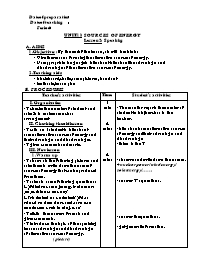Bài soạn môn học Tiếng Anh lớp 11 - Unit 11: Sources of energy - Lesson 2: Speaking

A. AIMS
1. Objectives : By the end of the lesson, sts will be able to:
- Give the reasons for using the alternative sources of energy.
- Use appropriate language to talk about talk about the advantages and
disadvantages of the alternative sources of energy.
2. Teaching aids:
- blackboard, chalk, some pictures, handouts
- textbook, lesson plan
B. PROCEDURES
Bạn đang xem tài liệu "Bài soạn môn học Tiếng Anh lớp 11 - Unit 11: Sources of energy - Lesson 2: Speaking", để tải tài liệu gốc về máy bạn click vào nút DOWNLOAD ở trên
Date of preparation: Date of teaching : Period: Unit 11: sources of energy Lesson 2: Speaking A. Aims 1. Objectives : By the end of the lesson, sts will be able to: - Give the reasons for using the alternative sources of energy. - Use appropriate language to talk about talk about the advantages and disadvantages of the alternative sources of energy. 2. Teaching aids: - blackboard, chalk, some pictures, handouts - textbook, lesson plan B. Procedures Teacher’s activities Time Student’s activities I. Organization - T checks the number of students and asks Ss to make some class arrangement. II. Checking the old lesson - T calls on 1 student to talk about some alternative sources of energy and their advantages and disadvantages. - T gives comments and mark. III. New lesson 1. Warm- up - T shows sts the following pictures and asks them to write down the name of sources of energy that can be produced from them. - T asks sts some following questions: + Which source of energy is the most popular in our country? + Is it limited or unlimited? What should we do to be sure that we can continue to use it in the future? - T elicits the answers from sts and gives comments. - T introduces the topic of the speaking lesson: advantages and disadvantages of alternative sources of energy. (picture) 2. Task 1: - T asks 1 student to read out the requirement of the task. - T asks sts to read through the sentences provided on page 127. T makes sure that sts understand the statements by explaining the meaning and pronunciation of some words. - T gets sts to do it individually. - T goes around the class to check and offers help. - T gets sts to compare their results with a partner’s. - T calls on some pairs to present their results 3. Task 2 - T asks 1 student to read out the requirement of the task. - T asks sts to read the useful language on page 128. T reminds sts that they should use the words or phrases as the cues. -T asks sts to work in pairs to ask and answer like this: A: I think that wind power can be an alternative source of energy. B: Why do you think so? A: Because our major sources of energy are running out while the wind is abundant and unlimited. B: I know it is also clean and safe to the environment. However, it is not available when there is no wind. - T calls on some sts to ask and answer about other sources of energy. - T elicits feedback from the class and gives final comments. 4. Task 3: - T asks 1 student to read out the requirement of the task. - T explains how to do the task. - T asks on student as model: T: I think more and more people will use the solar energy. S: Why do you think so? T: Because it is available, unlimited and easy to use. S: But it’s expensive and we can only use it at specific time of the year. -T asks sts to work in pairs to do the task. -T goes around, controls, and helps - T calls on some sts to present their talks. - T elicits feedback from the class and gives final comments. IV. Consolidation - T summarises the main points of the lesson. V. Homework - T asks sts to learn by heart all of the words and expressions used to talk about population explosion. VI. Feedback 1. Good points 2. Weak points 1 min 4 mins 4 mins 8 mins 12 mins 13 mins 2 mins 1 min - The monitor reports the number of students in his/her class to the teacher. - talk about some alternative sources of energy and their advantages and disadvantages - listen to the T - observe and write down the names. + nuclear power/ wind energy/ solar energy/. - answer T’s questions. - answer the questions. - get general information. - read the requirement aloud. - read through the sentences provided on page 83127 and try to understand them. - do it individually - ask for help if necessary - compare their results with a partner’s. - present their results. - read the requirement aloud. - read the useful language on page 128 and use the words or phrases as the cues. - work in pairs to to ask and answer about advantages and disadvantages of using each alternative sources of energy. - ask and answer. - listen. - read the requirement aloud. - listen to the teacher carefull - answer the questions - work in pairs to do the task. - ask for help if necessary - present their talks. - listen. - take note - take note
Tài liệu đính kèm:
 Speaking 11.doc
Speaking 11.doc





